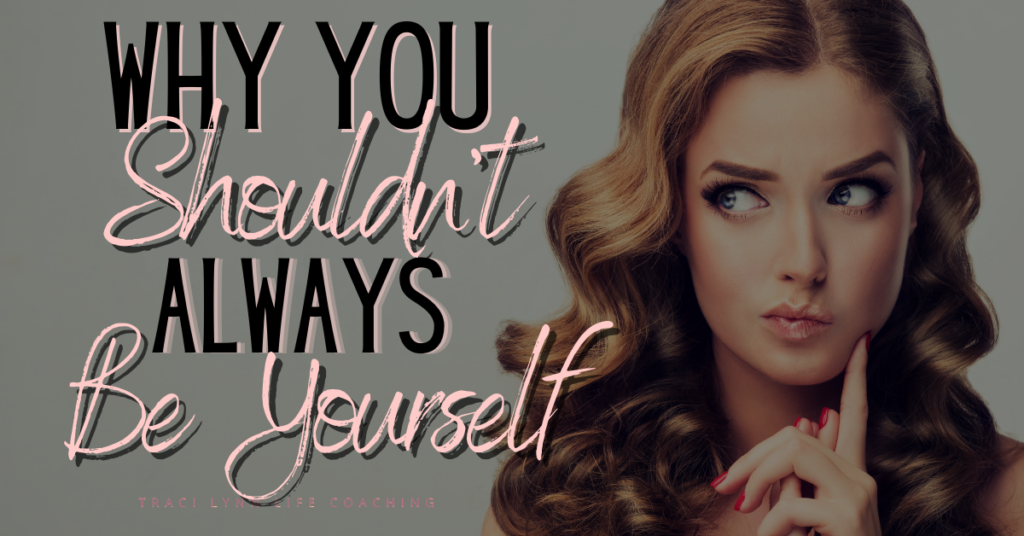
“Just be yourself!”
It is the common go-to phrase when someone is feeling fearful or nervous. And in most cases, it’s great advice! But, what if I told you that sometimes it is not such great advice to be yourself? What if I told you that one of the best ways to foster good relationships and to love yourself more was to NOT always be yourself? I know that sounds about as backwards Kris Kross’s wardrobe from the 90’s but hear me out.
Relationships are built on many things such as: having things in common, trust, loyalty, respect etc. Maintaining relationships is often determined by how you make the other person feel. And how you make people feel is determined by how you show up for them. The truth is, if I showed up in my natural state all the time, I may not have many friends left!
To help explain this, let’s start with who I am when I am living in my natural tendency’s (AKA: me – just being myself)
Good traits – Easy going. Strong emotional intelligence (being in control of my emotions, as opposed to the environment, situations or people controlling them). I form my own opinions but am open to hearing others out. Meet people easily and I am fun.
I have some traits that are also not so great. As opposed to calling them “Bad” traits – lets refer to them as “imperfect” traits.
Imperfect traits – I can be stubborn. Sometimes, I do not hold my tongue when people do not use common sense. I give too much unsolicited advice. I can be passive, impatient, and I can be too assertive and sometimes I am not assertive enough.
So, what does this mean?
What happens if my “too much advice-giving self” shows up for a friend who just wants to vent and be heard?
What happens if my impatience shows up at a time when patience is all someone needs from me?
If you are naturally relaxed and passive and you take those characteristics into your role as a mom or into your career – what are the consequences of that? If you are the boss at work and bring that home to your masculine male partner – what are the consequences of that?
I can tell you; personal and professional relationships could be strained.
While being yourself is important – so is knowing yourself and knowing how people want and need for you to show up for them.
Take stock in how your imperfect traits show up in your relationships
I have been in the personal development world for over 5 years so I give a lot of unsolicited advice to my friends. As soon as they start sharing their problems my mind goes into coach mode and starts racing about all the way’s in which I can help them fix it. Before learning this concept of showing up for others how they need, all I knew was how to be myself – the advisor. I had no conscious awareness that being myself was not always helping my relationships until a friend started a conversation with “I am going to tell you something, but I do not want you to coach me.” That is when it hit me. She wanted me to show up as a listener, as a safe place to be heard, as only a friend which was not my natural state of being.
I started to think about the roles I play in life and how I was showing up in each of them. I started to get curious about how I could make those relationships stronger by being who they needed me to be – not as my natural state of being. And then, I just started showing up as that person. It was a game changer. It not only helped with all relationships in my life it also made me a better friend, mom, partner, and peer. I became more empathetic, more connected, and more accepting of others and more confident within myself.
SO When is it ok to just be yourself?
The answer is all the time! I know you are probably like, “But Traci you JUST said…”
By making the choice to be more intentional in how you show up doesn’t change who you are. If you completely change who you are, then that is probably not the relationship you need. However, when you make changes by using less of your imperfect traits and focus on your good traits based on what your relationship needs, it becomes a part of who you are naturally.
I am still and will always be impatient, passive, and stubborn at times. The difference is that I make the conscious effort based on what the person needs in the moment before choosing a state of being.
Who are you as your natural self?
Awareness is key! Here is an exercise to get to know yourself and create some awareness. Below is an example of how to go through this process.
Write down what roles you have and what your traits are in each role. Then think about the relationship you have, are you showing up for how that person needs?
Mom – patient, understanding, accepting, loving, complimentary, supportive, an advisor when asked.
A business owner – Creative, consistent, knowledgeable, communicator, driven, patient
Life Coach – Listener, empathetic, supportive, educational, guidance
A partner – Supportive, loving, encouraging, fun,
Family – who am I in my family: a sister, a daughter, an aunt, a grandchild – Connector, loving, appreciative, caring, selfless, patient.
Friend – Supportive, accepting, nonjudgmental, loving, listener.
Teammate at work – Celebratory of their success, supportive, helpful.
Your Life Coach – Traci